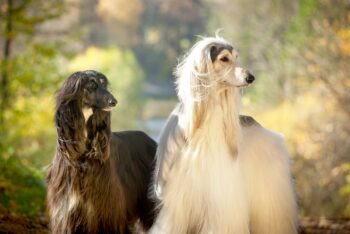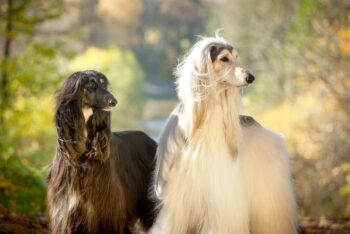Shutterstock
All dogs require regular grooming, but certain breeds need more frequent baths due to their coat type, skin conditions, or tendency to get dirty easily. Breeds with oily skin, thick coats, or a love for outdoor play often need extra attention to keep their fur clean and healthy. Regular baths help control odor, prevent skin irritations, and manage excessive shedding. For these dogs, consistent grooming and bathing are essential to maintaining their overall health, staying comfortable, and keeping their coats looking fresh and beautiful year-round.
Basset Hound
Shutterstock
Basset Hounds are known for their distinctive appearance, with long ears, droopy skin, and short legs. However, their loose skin and short coat can produce a strong “doggy odor” if not bathed regularly. Basset Hounds also have oily skin, leading to a greasy coat if not washed frequently. Their wrinkles and folds trap dirt and moisture, which can cause skin infections if not properly cleaned. Bathing a Basset Hound every two to four weeks helps control odor and keeps their skin healthy, especially in the folds where dirt accumulates.
Cocker Spaniel
Shutterstock
Cocker Spaniels have beautiful, silky coats, but maintaining that luxurious fur requires frequent bathing and grooming. Their coats are prone to becoming oily, especially around the ears, and they are also susceptible to skin irritations and infections. Cocker Spaniels often need baths every two to four weeks to remove excess oil and prevent matting. Since their ears are long and close to the ground, they are more prone to ear infections, so it’s important to clean and dry their ears during every bath to prevent problems.
Shih Tzu
Shutterstock
Shih Tzus are a small breed with long, flowing hair that requires consistent care to stay clean and healthy. Their coats are prone to matting, and they produce natural oils that can make their fur greasy if not cleaned regularly. Bathing a Shih Tzu every two to three weeks helps remove dirt, tangles, and excess oils, keeping their coats silky and soft. For Shih Tzus that live in humid or dusty environments, more frequent bathing may be necessary to prevent skin irritations and matting.
Bulldog
Shutterstock
Bulldogs are known for their stocky build and wrinkled skin, which requires regular maintenance to avoid odor and infections. Their skin folds trap moisture, dirt, and bacteria, leading to skin issues if not cleaned thoroughly. Bulldogs benefit from a bath every three to four weeks to keep their skin and coat healthy. After bathing, it’s crucial to dry between their skin folds to prevent moisture from causing infections. Regular cleaning helps prevent the “bulldog smell” and keeps their coats fresh and clean.
Poodle
Shutterstock
Poodles, whether Standard, Miniature, or Toy, are known for their hypoallergenic, curly coats that require regular grooming and bathing. Their tight curls trap dirt and oils, leading to matting if not properly maintained. Poodles need baths every three to four weeks to keep their coats clean and free from mats. After a bath, their curls should be thoroughly brushed and dried to maintain their texture and prevent tangling. Regular grooming and frequent baths are essential to keep a Poodle’s coat healthy and beautiful.
Maltese
Shutterstock
Maltese dogs have long, silky coats that need regular attention to prevent matting and tangling. Their fine hair is prone to becoming dirty, especially since their white coats easily show dirt and stains. Maltese should be bathed every two to three weeks to maintain its coat’s shine and softness. Their sensitive skin requires the use of gentle, moisturizing shampoos to avoid irritation. Regular brushing and conditioning after baths help keep their hair from becoming tangled and reduce the risk of matting.
Afghan Hound
Shutterstock
Afghan Hounds are known for their elegant, flowing coats, but maintaining that beautiful hair requires frequent care. Their long hair is prone to tangling, especially around the legs and ears, and can become dry if not bathed and conditioned regularly. Afghan Hounds benefit from baths every two to four weeks to keep their coats clean, soft, and tangy-free. After bathing, their hair should be carefully brushed and dried to prevent matting and maintain their coat’s signature smooth texture.
Yorkshire Terrier
Shutterstock
Yorkshire Terriers, or Yorkies, have long, silky coats that require frequent grooming to stay healthy. Their hair is prone to becoming oily and tangled, so regular baths are essential to keep their coat in good condition. Yorkies should be bathed every two to three weeks, with special attention to conditioning their coats to maintain shine and softness. Since their fine hair can become matted if not properly cared for, brushing and trimming after a bath are key to preventing tangles.
West Highland White Terrier
Shutterstock
West Highland White Terriers, or Westies, have bright white coats that can quickly become dirty, especially if they love to dig or play outside. Their coarse hair requires regular baths to maintain its color and texture. Westies also have sensitive skin that can dry or irritate if not cleaned regularly. Bathing a Westie every two to four weeks helps remove dirt and excess oils, keeping their coats bright and healthy. A whitening shampoo can help maintain their iconic white coat while protecting their skin.
Havanese
Shutterstock
The Havanese is a small breed with a long, flowing coat that requires consistent grooming and bathing to stay clean and mat-free. Their coats can easily become tangled and dirty, especially since Havanese love to play outside. A bath every two to three weeks helps remove dirt and excess oil, keeping their coats shiny and soft. Since their hair is prone to matting, regular conditioning after a bath is essential to maintain the health of their coat. Frequent brushing and grooming between baths help reduce the risk of tangles.
Lhasa Apso
Shutterstock
Lhasa Apsos are small dogs with long, dense coats that require regular bathing to prevent matting and tangling. Their thick hair can easily trap dirt and debris, especially around the face and paws, so frequent baths are essential to keep their coats clean. Lhasa Apsos should be bathed every two to four weeks to remove dirt and oils, with careful attention to drying and brushing after each bath. Their luxurious coats require extra grooming to maintain their health and prevent mats from forming, especially in humid or dirty environments.
Bichon Frise
Shutterstock
Bichon Frises have soft, curly coats that are prone to matting and require frequent grooming to stay in good condition. Their curls can easily trap dirt and oils, leaving a greasy coat if not regularly bathed. Bichons should be bathed every two to four weeks to keep their coats clean and fluffy. Regular conditioning and brushing after baths help maintain their coat’s texture and prevent tangles. Frequent grooming is key to keeping a Bichon’s coat healthy and free from mats, especially in areas prone to tangling, like behind the ears and around the legs.
Bathing for a Healthy, Beautiful Coat
Shutterstock
For these dog breeds, frequent bathing is essential to maintaining their coat’s health and appearance. Whether it’s to prevent matting, control oil production, or keep their skin clean, regular baths help these breeds stay comfortable and odor-free. While it may require extra effort, frequent grooming and bathing are essential for these high-maintenance breeds, ensuring they remain happy, healthy, and looking their best. If you’re considering one of these breeds, be prepared for a regular bathing schedule to keep your dog’s coat in top condition.
The post 12 Dog Breeds That Need the Most Frequent Bathing appeared first on iHeartDogs.com.


